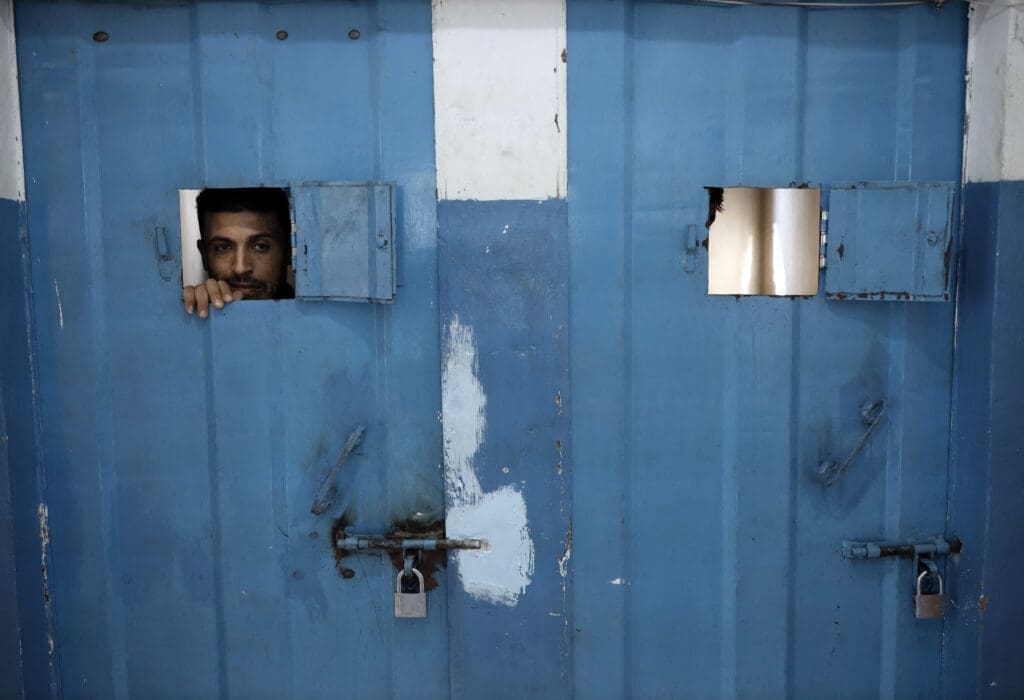On the morning of Monday, July 29, a contingent of Israel’s military police—the agency responsible for policing the security forces—arrived at Sde Teiman, an Israeli military base in the Negev Desert that now serves as a detention center for Palestinians from the Gaza Strip. The military police had come to arrest nine military reservists who serve at the site, which whistleblowers have raised concerns about for months.
The soldiers were wanted for their involvement in the sexual abuse of a prisoner who was hospitalized weeks earlier with severe rectal injuries. Almost immediately, Israeli politicians took to the airwaves to denounce the arrests, proclaiming the accused soldiers to be heroes on account of their torture of Palestinian prisoners, and leading a mob of their supporters to break into Sde Teiman to protest the arrests. It was not just any mob, but one that included government ministers, members of parliament and soldiers in uniform.
Later that day, similar scenes were repeated at the Beit Lid military base, where the soldiers had been transported for questioning. Although breaking into or out of a prison is considered a serious violation of Israeli law, thus far not a single individual has been arrested, or even questioned.
The Sde Teiman prison camp has elements of both Abu Ghraib, the U.S. torture center in Iraq, and a Gestapo interrogation center. Among the documented abuses, based on testimonies of both former prisoners and prison staff, are torture; severe malnutrition and dehydration; amputations after the prolonged use of zip-ties that have been deliberately tightened to block circulation to hands and feet; and surgeries performed without anesthetic and by unqualified medical students. Several dozen Palestinians have been killed at the camp, through torture or denial of basic needs such as medication for chronic illness.
It bears recollection that the war crime of torture is considered legal, in “very exceptional cases,” in Israel and has been confirmed as such by its supreme court—most notably in 1987. Moreover, Israel considers Palestinians to be unlawful combatants who are not entitled to the protections offered by customary law on such matters. And additionally, Israel’s most senior leaders have engaged in a systematic campaign of demonization and dehumanization of Palestinians, and of those suspected of membership in Hamas in particular, which amounts to a license to torture, rape and kill.
The arrested soldiers were essentially told to do as they please with Palestinians and assured that, per standard practice, there would be no consequences of any sort. At one level one can therefore understand the astonished response of the accused rapists when told they would be arrested for conduct that has been officially sanctioned on a systematic basis.
The case also reflects deeper changes within Israel. Its military has, to put it mildly, admittedly never had a reputation for discipline, but it functioned as the central institution of the Israeli state and society.
Israel has on this basis been described as an army with a state rather than a state with a military. But that is beginning to change. As Geoffrey Aronson has argued, recent years have seen the emergence of a new class of Israeli politicians, most notably National Security Minister Itamar Ben-Gvir and Finance Minister Bezalel Smotrich. In contrast to many of their predecessors, they did not enter and succeed in politics on the strength of a military career, but rather built successful careers through opposition to and delegitimization of Israel’s security establishment. Their preferred armed force is not a regular army, but rather militias and mobs.
July 29 was not so much a turning point as visible evidence that this shift within Israel is alive, well and rapidly gaining momentum. That it should burst onto the scene in defense of sexual violence against Palestinians should therefore not come as a particular surprise. There are many other notable elements to this issue, not least of which would be the observation that every accusation is a confession. Another would be that government ministers and members of parliament rank somewhat higher in the pecking order than falsely accused staff of the United Nations agency for Palestinian refugees.
Israel’s Impunity Under International Law
There is growing concern within Israel about sustaining its impunity with respect to its dealings with the Palestinian people. As Dimi Reider pointed out, the Israel Defense Forces’ chief of staff, Herzi Halevi, in his condemnation of the riots, asserted that military police investigations are essential to protect Israeli soldiers “at home and abroad … [the latter] meaning the Hague” where the International Criminal Court (ICC) and International Court of Justice are based. Thanks to efforts initiated by the United Kingdom, which argued that the ICC’s authority is limited to the investigation and prosecution of Palestinians only, the court permitted multiple challenges to its jurisdiction over Israeli crimes perpetrated in the occupied Palestinian territories.
A particularly specious set of arguments has been put forth by Germany, arguably the most experienced state when it comes to the crimes enumerated in the Rome Statute. One of Berlin’s arguments is that the ICC should not pursue arrest warrants until Israel has essentially completed the commission of its crimes against the Palestinian people and considers its business concluded.
The other argument concerns “complementarity”—the principle according to which the ICC can and will only pursue prosecutions where national judiciaries fail to conduct such procedures themselves. In its paeans to Israel’s judiciary, Berlin conveniently neglects that every independent study of Israel’s judiciary with respect to crimes committed by Israelis against Palestinians has concluded that the primary role of this apparatus has been to enable, legitimize and whitewash the crimes concerned. Even were this not the case, the way ICC complementarity works is that the national judiciary would have to credibly investigate and, if appropriate, prosecute and convict the same individuals for the same crimes for which they stand accused by the ICC.
In other words, Germany’s desperately furious efforts to defend the genocidal Israeli regime will prove of little use to Netanyahu and Israeli Defense Minister Yoav Gallant. But Halevi, a representative of Israel’s traditional military elite, sees the writing on the wall. He and his fellow officers do not want to share Netanyahu and Gallant’s fate, and the many difficulties this would entail even short of arrest and prosecution. So they are creating an argument for complementarity. In a rational society, Halevi would be hailed for his foresight and criticized for waiting so long to act. But a society where government ministers, members of parliament, uniformed soldiers and a mob of brownshirts riot at two separate locations on a single day in defense of group sexual assault cannot be considered rational.
Indeed, in recent days video evidence has emerged of sexual abuse in Israel’s Sde Teiman. In this respect it may or may not be relevant that, already several years ago, the Chief Rabbi of the Israeli Defense Forces previously implied that rape is a legitimate weapon of war. If this sounds like ISIS, don’t tell Washington. In predictable fashion, U.S. State Department spokesperson Matthew Miller responded to the above developments with a demand that Israel investigate itself.


